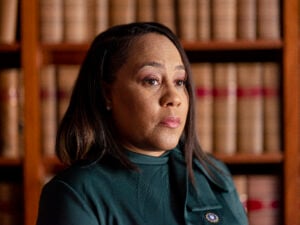[ad_1]

Fani Willis (Photo by David Walter Banks/Getty Images)
Donald Trump’s bid to derail the Georgia election interference indictment ran aground this morning as Judge Scott McAfee ruled that the Fulton County District Attorney’s Office can stay on the case.
TL, DR? Don’t sleep with your direct report on the biggest case of your career. Just don’t.
The sprawling RICO prosecution has been in chaos for two months since former Trump campaign official Mike Roman revealed that DA Willis was romantically involved with Nathan Wade, the outside attorney hired as special prosecutor on the case. The allegations, which appeared to have come from Wade’s sealed divorce proceedings, were couched in a motion to dismiss the case on dubious procedural grounds, or to disqualify the FCDA entirely.
No one gave a damn about the procedural complaints, which had been previously rejected and rated just a couple of pages in this morning’s order. But we all watched hours of nasty, televised hearings dissecting the sex lives, bank accounts, and cellphone records of consenting adults in excruciating detail. It was a huge black eye for the FCDA, which certainly appears to have misrepresented the nature and timing of the relationship to the court. Or as Judge McAfee put it, “[N]either side was able to conclusively establish by a preponderance of the evidence when the relationship evolved into a romantic one. However, an odor of mendacity remains.”
Whether or not an actual conflict existed, giving Willis an incentive to prolong the case so her boyfriend could bill more hours, the optics were just terrible.
“The appearance standard recognizes that even when no actual conflict exists, a perceived conflict in the reasonable eyes of the public threatens confidence in the legal system itself,” the judge scolded. “When this danger goes uncorrected, it undermines the legitimacy and moral force of our already weakest branch of government.”
While an actual conflict would require disqualification of the entire Fulton County District Attorney’s Office (as happened during the special purpose grand jury proceedings when DA Willis held a fundraiser for one of the defendant’s political rivals), Judge McAfee concluded that the mere appearance of impropriety leaves the remedy to the court’s discretion.
“[I]t is the undersigned’s opinion that Georgia law does not permit the finding of an actual conflict for simply making bad choices – even repeatedly – and it is the trial court’s duty to confine itself to the relevant issues and applicable law properly brought before it,” he wrote.
After decrying “this tremendous lapse in judgment” which creates a “prima facie argument” of “financial enrichment and improper motivations which inevitably and unsurprisingly invites a motion such as this,” the court found that “Defendants failed to meet their burden of proving that the District Attorney acquired an actual conflict of interest in this case through her personal relationship and recurring travels with her lead prosecutor.”
Castigating “the unprofessional manner of the District Attorney’s testimony during the evidentiary hearing,” the court ruled that Willis did not have a pecuniary interest in prolonging the prosecution; in fact her office has consistently sought to advance the case to trial expeditiously. So she can either recuse her entire office (not bloody likely) or she can purge the “significant appearance of impropriety” by axing Wade.
But the court wasn’t through reading the prosecution for filth.
“Wade’s patently unpersuasive explanation for the inaccurate interrogatories he submitted in his pending divorce indicates a willingness on his part to wrongly conceal his relationship with the District Attorney,” the court fumed.
And while he refused to call it “forensic misconduct,” Judge McAfee was deeply unimpressed with DA Willis’s decision to take to the pulpit of a historic Black church on MLK Day to characterize the defendants’ motions as playing the “race card.”
“The effect of this speech was to cast racial aspersions at an indicted Defendant’s decision to file this pretrial motion,” he wrote, adding that “The time may well have arrived for an order preventing the State from mentioning the case in any public forum to prevent prejudicial pretrial publicity, but that is not the motion presently before the Court.”
Motion for protective order dropping in 3…2…
The defendants, who have every incentive to push this case off as long as possible, are likely to appeal. But for today, the FCDA limps away with only its reputation shredded, and the Trump RICO case lives to fight another day.
Liz Dye lives in Baltimore where she produces the Law and Chaos substack and podcast.
[ad_2]




